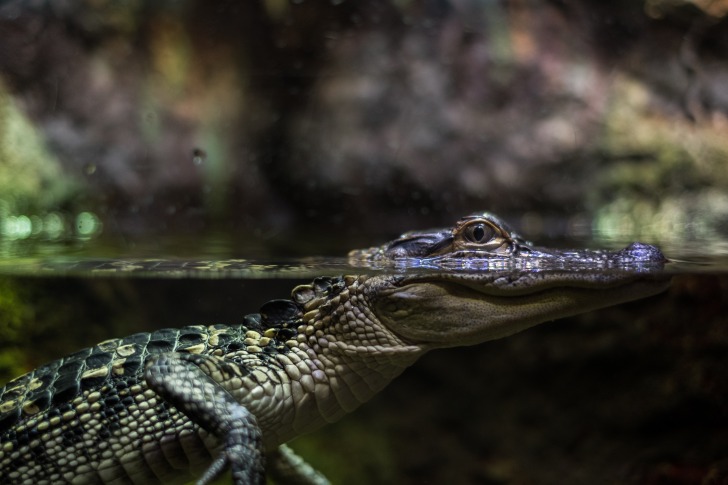There should be no alligators in Illinois.
It is far too cold in the northern part of the state.
The southern part would be marginal at best, and so far at least there are no natural alligators.
Even so, some are spotted at times.
If there are alligators, they are either in a zoo or have been released into the wild by people who had them as pets.

Contents
So… Are There Alligators in Illinois?
It would be extremely rare to come across an alligator in the wild in Illinois.
It is not their natural habitat and the environment is not friendly to them.
There are some in the state though, and they were brought there by various means.
Just last year a four-foot-long alligator was caught living in a lagoon at Humboldt Park in Chicago.
Local wildlife officials tried unsuccessfully to catch the alligator, and they had to call in outside help.
It had a name in local news media and was eventually caught and moved to a more alligator-friendly area.
There was another alligator found in Lake Michigan about a year before that.
Alligators are so rare in Illinois that it makes statewide news when one is spotted or captured.
It is illegal to own an alligator in Illinois, and it is illegal to release one in a public park.
There is a problem with people releasing alligators after they realize it is not a good pet to have.
Alligators can survive well in a wet area in summer, and can potentially survive even a cold Illinois winter.
They go into brumation, which is similar to what mammals do when they hibernate.
Their body slows down a lot and they are lethargic.
They do move around some.
They do not eat, but they do drink some water.
Alligators have been known to keep their snouts above water so they can breathe, even if that body of water freezes over.
As long as the water around them does not freeze solid, they will not likely die due to the cold weather.
Even so, there are no known cases of alligators living year-round in Illinois other than in zoos around the state.
Alligator Species in Illinois
There are only two species of alligator.
One lives primarily in the southeast United States, and the other one is in China.
They are very similar but the Chinese version is about half the size and has a bigger head related to the rest of its body.
The few alligators that have been found in Illinois are of the American alligator variety.
The zoo in Brookfield has an albino alligator.
The zoo in Peoria has a Chinese alligator.
All of the other ones are American alligators.
Is it Safe to Swim in Illinois?
It is as safe to swim in Illinois as it is in any other state.
Illinois ranks 33rd in deaths by drowning, so you could argue it is safer than other states.
You are very unlikely to see an alligator while swimming, but there are other dangers.
The greatest danger in swimming in Illinois is the things you don’t see.
Polluted water can cause a lot of diseases and illnesses, such as E. Coli.
Try to find clean areas, and avoid any area that has any swimming warnings.
There are snakes and other creatures native to Illinois that could cause injury.
There are things under the water that you cannot see that could cause injury as well.
State officials have marked off areas that are safe and that is where you should swim.
There are beaches along rivers, as well as Lake Michigan, that are great for swimming.
Even there you have to watch out for currents and waves that could get you in trouble.
Interesting Alligator Facts in Illinois
Most of Illinois is too cold for alligators to survive, and there are not very many found.
There are none that are natural to the area.
The southern part of the state has a lot of wetlands that could potentially work as alligator habitats as the climate gets warmer.
Alligators have been expanding along the Mississippi River northward.
Alligators have a very strong bite.
They can clamp down on food with a force of 3000 pounds per square inch.
A crocodile is even stronger, at about 3,800 pounds.
Normal human eating exerts about 100 pounds of force.
While alligators have very strong jaws, the muscles they use to open their mouth are very weak.
While a gator can bite off a human arm easily, a person can keep a gator’s mouth shut with one hand.
Alligators live only in the United States and in China, while crocodiles live in tropical areas around the world.
The southern tip of Florida is the only place in the world where you can find both.
Alligators are very quickly over short distances.
They can probably outrun you for 30-40 feet, but they tire quickly.
This is why wildlife officials recommend staying 50 feet away from them.
Alligators can live for 60 years in the wild, and 70 in captivity.
They will continue to grow as long as they live, but the speed of growth slows after a few years.
The teeth of alligators grow back if they get broken off, or if they wear down.
They may have 80 teeth in their mouth at one time and may go through 1,000 or more teeth over their lifetime.
Alligators store fat in their tails, which they can survive on if they have nothing to eat.
It is not uncommon for an alligator to eat only once per week.
They do more often if food is available.
They can go a year or more without eating and survive.

Alligators vs. Crocodiles
Alligators and crocodiles are part of the same family and they have a lot of similarities.
They have some significant differences, however.
Alligators have a powerful bite of 300 or more pounds per square inch.
Crocodiles have the strongest bite of any creature in the world at 3,700 pounds per square inch.
They both have weak muscles for opening their mouths, which can be held shut with one hand.
Alligators have about 80 teeth, while crocodiles have a consistent 66 teeth.
Alligators can grow up to 800 pounds and can be 12 feet long, though most are somewhat smaller than that.
Crocodiles can get up to 20 feet long and weigh 2,000 pounds.
Alligators have a rounded mouth or snout, while crocodiles have a sharper, more V-shaped mouth.
Crocodile teeth are visible when the mouth is closed, while alligators are not.
The words Alligator and Crocodile are used interchangeably in the modern American language.
They are closely related biologically, but they are different species.
Both are in the Crocodilian family and have some distinct differences.
Alligators are dark gray with cream-colored bellies.
Crocodiles are light brown or olive green and also have a lighter underside.
Alligators have webbed feet and are better swimmers.
Crocodiles have more pronounced toes and are better at moving on the ground.
Both can move very fast for a short distance.
3 Safety tips for swimming in alligator-infested water.
It is very unlikely you will come across an alligator while swimming anywhere in Illinois.
If you happen to see one while swimming, you should get out of the water and report it to game officials as soon as possible.
Here are three tips for swimming safety in Illinois.
There is one death by drowning per 100,000 in Illinois, and 33 states have higher rates.
- Swim in designated swimming areas. The greatest danger in Illinois is being injured by things under the water that you cannot see. Local officials have found areas that are safe and they are marked. If there are signs posted warning you about dangers, you should heed those warnings because the dangers are probably real.
- Water quality. A greater danger in Illinois than the alligator is pollutants in the water. Water has been known to have bacteria that can cause all sorts of diseases, including E. Coli. Public pools usually have treated water and are safer for swimming. Consider the water quality where you swim. Avoid places with factories nearby.
- Don’t swim alone or at night. If you do happen to get in trouble, you will need some help. This is why you should never swim alone. Swim in groups and keep your eyes on each other. At night there is not enough light to see, and you could get injured by things in the water. Animals look for food at night, and there is a greater danger of having a bad encounter then.
Summary
Alligators are so rare in Illinois that it makes news if one is even spotted, much less captured.
There are none that are native to the state.
A few have been released into the wild by people, and that accounts for the very few that are there.
There are some in zoos, and you can see them here in Illinois.
Illinois Safety Overview
READ THE FULL REPORT: Illinois Safety Review
Safety Index:
- OVERALL RISK: MEDIUM
- TRANSPORT & TAXIS RISK: MEDIUM
- PICKPOCKETS RISK: MEDIUM
- NATURAL DISASTERS RISK: LOW
- MUGGING RISK: HIGH
- TERRORISM RISK: MEDIUM
- SCAMS RISK: MEDIUM
- WOMEN TRAVELERS RISK: LOW
Frequently Asked Questions
What are the most common injury accidents around water in Illinois?
Boating accidents cause the most injuries around water.
Last year there were 36 serious injuries and 21 fatalities due to boating accidents in the state.
Did alligators almost go extinct?
Yes, they did, due to overhunting.
Alligators have never been native to Illinois.
They live in warmer climates and for years were hunted and killed for their hide and meat.
In 1967, they were listed as an endangered species.
Hunting of alligators was made illegal, and other wildlife conservation efforts have brought them back to stable population size.
They are no longer considered endangered and are even a nuisance in some areas of the south.
There are controlled hunts now that happen at certain times of year in the southeast.
Can you legally own an alligator in Illinois?
No, they are illegal to own, and illegal to release into the wild.
Individuals may not own alligators in Illinois.
The only people who can have them are zoos, veterinary hospitals, animal refuges, or federally licensed exhibits.
Do alligators make good pets?
No, they do not.
Expert zookeepers can train them to some degree, and even that is difficult.
They keep growing as long as they are alive, and they will be very hard to contend with once they are at or beyond four feet long.
They are aggressive and smart though.
They can break out of enclosures, and may eventually decide that your arm looks like something good to eat.
Could an alligator survive on his own in Illinois?
It is possible that an alligator could survive the winter in Illinois, but it would be difficult.
They would be OK in summer but would have a rough time in winter.
Alligators can go into brumation, similar to hibernation, and survive as long as the water immediately around them does not freeze.
They are tough animals, but their body does not adjust to temperature changes, and that makes cold weather very difficult.












The greatest danger to swimmers in Illinois is not alligators, but pollutants in the water.
Swim in designated areas, and avoid any area that has warnings posted.
Never swim alone, and avoid swimming at night.
Alligators are very strong animals, but they are not likely to attack humans unless provoked.
There are some differences between alligators and crocodiles, but they are closely related.
Both are found in the United States, and both are in zoos in Illinois.
Alligators can survive in Illinois, but it is not their natural habitat.
The southern part of the state has a climate that could potentially work for them, but it is not ideal.
The chances of seeing an alligator while swimming in Illinois are extremely low, so there is no need to worry.
In my opinion, while it is interesting to learn about alligators and their presence in Illinois, the likelihood of encountering one while swimming is very low and should not be a major concern for people.
Alligators are very strong and can be dangerous, but they are not normally aggressive.
You should not be afraid to swim in Illinois because of alligators.
You should, however, be aware of your surroundings and take precautions when swimming in any body of water.
It is important to remember that while alligators are fascinating creatures, they are wild animals and should be respected and observed from a safe distance.
In my opinion, it is best to leave alligators in their natural habitats and not try to bring them into areas where they do not belong.
No, there are no alligators in Illinois.